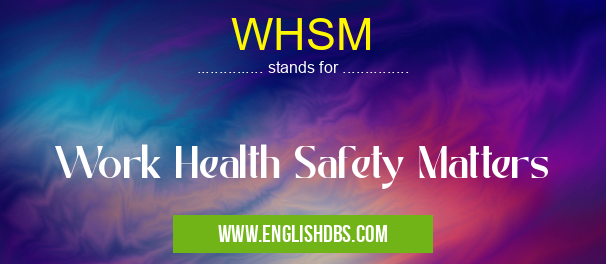What does WHSM mean in HEALTHCARE
Work Health Safety Matters (WHSM) is a term used to describe the health and safety practices associated with the workplace. It focuses on ensuring that workers and employees are kept safe, healthy, and productive in their roles. By providing the appropriate resources, information, and training to employers and employees alike, WHSM can help ensure compliance with local, state, and federal regulations while preventing injuries and illnesses in the workplace.

WHSM meaning in Healthcare in Medical
WHSM mostly used in an acronym Healthcare in Category Medical that means Work Health Safety Matters
Shorthand: WHSM,
Full Form: Work Health Safety Matters
For more information of "Work Health Safety Matters", see the section below.
» Medical » Healthcare
Essential Questions and Answers on Work Health Safety Matters in "MEDICAL»HEALTHCARE"
What is Work Health Safety (WHS)?
Work Health Safety (WHS) is the common name given to the Occupational Health and Safety (OHS) Act of each Australian State and Territory, which sets out the legal framework for protecting workers’ safety and health at work. The primary aim of WHS is to minimise the risk of injury or illness to any person in the workplace.
Is there a national harmonized system for WHS?
Yes. Australia has adopted a nationally harmonized system for WHS, with some minor variations between states and territories. This means that employers must comply with the laws in their jurisdiction, but employers can use the same systems and processes across state boundaries, making it easier for employers to have a consistent approach toward safety management throughout their entire organisation.
Are employees responsible for their own safety in the workplace?
Although employers are ultimately responsible for providing a safe working environment, all workers also have responsibilities under WHS legislation to take reasonable care of their health and safety as well as that of everyone else in the workplace. This includes following any procedures and instructions provided by the employer as part of ensuring a safe work environment.
Who is responsible for conducting risk assessments in the workplace?
Risk assessments are an important part of occupational health and safety management, which an employer is required to conduct on a regular basis according to legislation. The exact process will vary from jurisdiction to jurisdiction but typically involves identifying hazards associated with particular tasks or activities within a workplace and then determining how best to minimise those risks.
Are there penalties for non-compliance with WHS laws?
Employers who fail to comply with WHS laws may face significant penalties depending on what has occurred or whether there has been ongoing non-compliance over time. This could involve fines, cease work orders or even criminal charges if negligence or reckless behaviour has caused death or serious injury in the workplace.
How can employers ensure they are meeting their obligations under WHS legislation?
Employers should ensure that they remain up-to-date with changes in state/territory specific legislation related to WHS requirements. It is also essential that employers have adequate systems and processes in place such as training programs for staff, regular hazard identification exercises, enforcement of safety policies & procedures etc., so they can meet their obligations under current regulations adequately.
Is it necessary for organisations to appoint designated persons responsible for compliance with WHS regulations?
In many cases it may be beneficial for organisations to appoint individuals responsible specifically for monitoring compliance with relevant regulations, although this depends largely on organisational needs. For example larger companies may need dedicated staff while smaller organisations may just need one individual overseeing compliance on behalf of all employees/contractors etc.
What happens if I am injured while I am at work?
If you sustain an injury while you are at work then you should report this immediately so that your employer can record it within its incident reporting system as well as arrange any necessary medical attention or assistance required by you at that time. Depending upon where you live in Australia, your employer may also be obligated make payments towards your medical costs through either industrial insurance policies or statutory provisions.
What type of hazards need to be monitored within workplaces?
There are numerous types of hazards that must be monitored within workplaces including physical hazards such as noise levels; biological hazards such as exposure chemicals/substances; ergonomic hazards such stressors; psychosocial issues related conflict between colleagues; psychological hazards resulting from hazardous working conditions such excessive workloads etc.
Final Words:
As a whole, Work Health Safety Matters (WHSM) covers all aspects related to keeping workers safe at their respective workplaces. From providing resources that support regulatory compliance with regards to safety standards to implementing thorough training programs that educate staff on handling potentially dangerous materials – understanding what obligations employers have when it comes to employee protection is paramount for any workplace situation where there may be physical risks involved.
